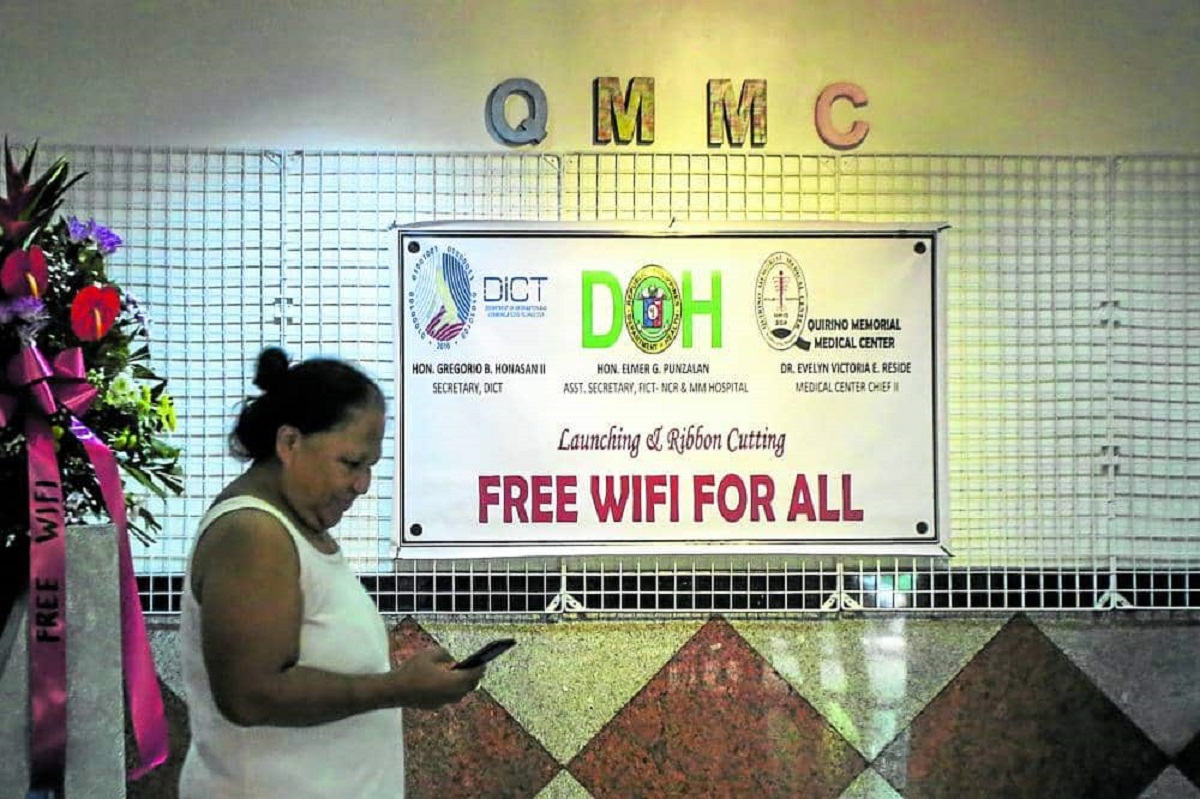
HOW’S THE SIGNAL? A sign marks a free Wi-Fi site inside the government-run Quirino Memorial Medical Center in Quezon City. Photo taken on July 2, 2019. —Inquirer photo
MANILA, Philippines — About 2,600 free Wi-Fi sites nationwide went offline due to the government’s inability to pay the telecommunications contractors, according to the Department of Information and Communications Technology (DICT), which is now asking Congress for a bigger budget of P9 billion to turn them back on and expand coverage.
Information and Communications Secretary Ivan John Uy, on the sidelines of an event in Pasay on Wednesday, told reporters that 20 percent of the more than 13,000 free Wi-Fi sites had stopped operations as the agency did not have enough funding to renew the contracts to operate them.
READ: 772 free Wi-Fi sites in Mindanao coming soon
The Wi-Fi sites that have become nonoperational include those situated in remote areas where internet access is already lacking.
May need rebidding
Uy said they have been asking for the funds to be released as early as December last year and the DICT has been following this up since.
He noted these sites might be offline for at least 60 days as they would need to find new contractors again to operate the infrastructure following the expiration of the concession.
“If the fund disbursement is late, we won’t be able to renew the contracts immediately. When the contract expires, we need to undergo rebidding,” he said.
Uy added that the budget should have been released last July 25, but the Department of Budget and Management was giving the agency about P4 billion to cover only the renewal of the free Wi-Fi contracts.
The agency would need an additional P5 billion to fund the expansion as well, Uy noted.
“We’re hoping Congress will be sympathetic,” he said.
The expansion of free Wi-Fi sites, according to Uy, is in line with the directive of President Ferdinand Marcos Jr. himself.
In its latest report, the DICT said its free Wi-Fi program benefits 9.8 million users across 1,401 cities and municipalities, including 3,040 geographically isolated and disadvantaged areas.
Connectivity for all
This program aims to improve internet connectivity in public places across the country, including public parks, plazas, libraries, barangay centers, national and local government offices, public basic education institutions, state universities and colleges, public hospitals, rural health units, public airports and seaports, and public transport terminals.
The DICT also recently launched the National Fiber Backbone, which spans 1,245 kilometers and connects 14 provinces from Laoag in Ilocos Norte to Quezon City. A fiber cable network serves as the digital highway for the transmission of data.
The DICT launched the free public internet access program in 2017 as part of an ambitious government program to provide free public Wi-Fi to all citizens in all public places in the country.
To accelerate the program’s rollout, the DICT partnered with the United Nations Development Program in 2018 to add 6,000 last-mile sites in the remotest, unserved, and disadvantaged communities.
The main objective of the partnership is to ensure that people from disadvantaged communities can improve their educational attainment, deepen their engagement in governance processes, and avail themselves of opportunities for economic development through increased access to up to 6,000 public Wi-Fi hot spots.